Business Law Assignment: Analyzing Contractual Disputes and Solutions
VerifiedAdded on 2020/10/05
|10
|3084
|439
Report
AI Summary
This business law report provides a detailed analysis of contractual issues, offering solutions based on Australian business law and contract law principles. The report begins with an introduction to business law, emphasizing its role in regulating commercial activities and preventing fraud. The main body of the report addresses a case study involving a company's advertisement for a sound system, analyzing the rights of various parties based on their interactions with the company. It delves into the concepts of offer, acceptance, invitation to treat, and legal obligations, referencing relevant case laws such as Pharmaceutical Society of Great Britain v Boots Cash Chemists and Felthouse v Bindley. The application section applies these rules and laws to the case scenario, providing advice on the legal standing of each party involved. The report concludes with a summary of the findings, offering insights into the formation of valid contracts and the importance of communication in contractual agreements. This assignment is a valuable resource for students seeking to understand contract law and its practical applications.

Business Law
Paraphrase This Document
Need a fresh take? Get an instant paraphrase of this document with our AI Paraphraser
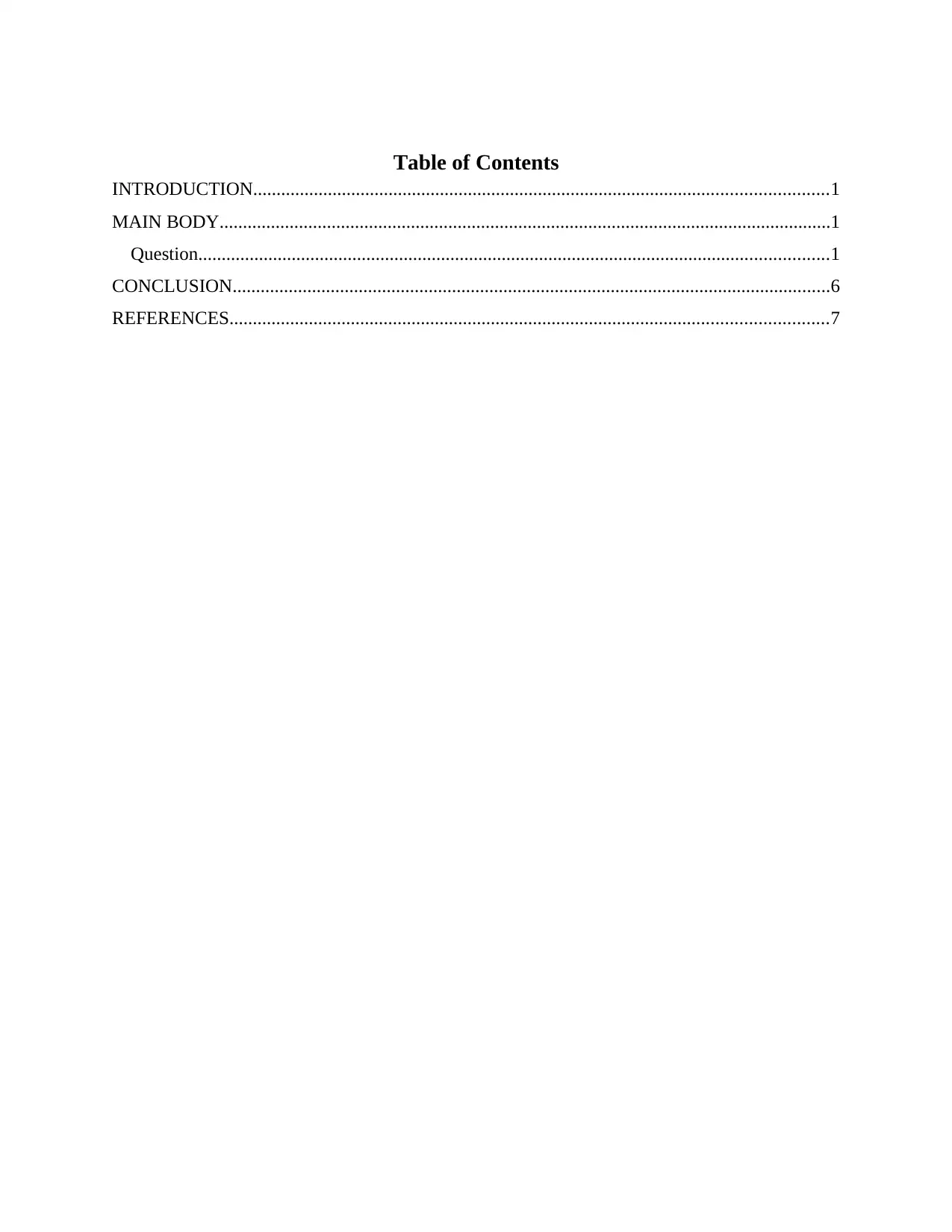
Table of Contents
INTRODUCTION...........................................................................................................................1
MAIN BODY...................................................................................................................................1
Question.......................................................................................................................................1
CONCLUSION................................................................................................................................6
REFERENCES................................................................................................................................7
INTRODUCTION...........................................................................................................................1
MAIN BODY...................................................................................................................................1
Question.......................................................................................................................................1
CONCLUSION................................................................................................................................6
REFERENCES................................................................................................................................7
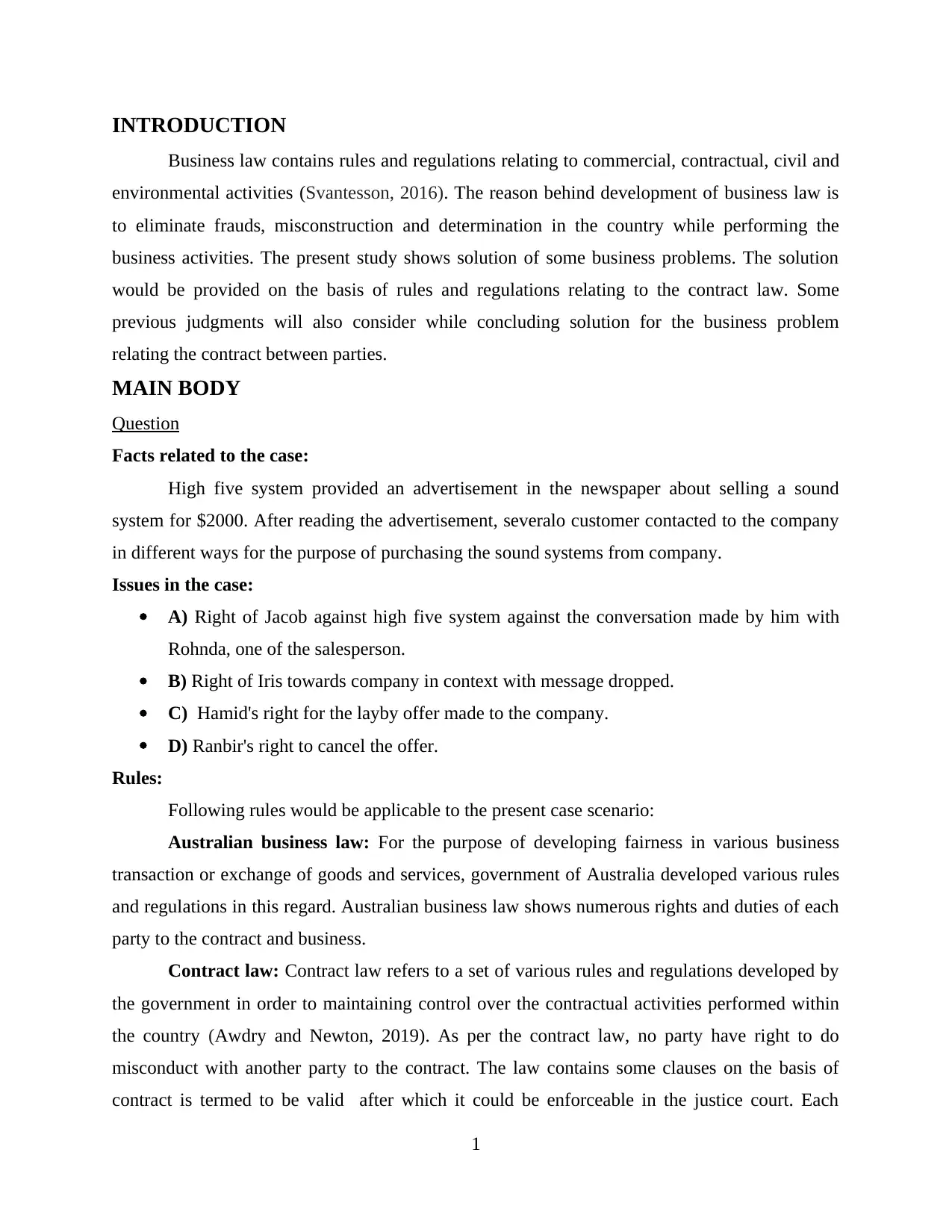
INTRODUCTION
Business law contains rules and regulations relating to commercial, contractual, civil and
environmental activities (Svantesson, 2016). The reason behind development of business law is
to eliminate frauds, misconstruction and determination in the country while performing the
business activities. The present study shows solution of some business problems. The solution
would be provided on the basis of rules and regulations relating to the contract law. Some
previous judgments will also consider while concluding solution for the business problem
relating the contract between parties.
MAIN BODY
Question
Facts related to the case:
High five system provided an advertisement in the newspaper about selling a sound
system for $2000. After reading the advertisement, severalo customer contacted to the company
in different ways for the purpose of purchasing the sound systems from company.
Issues in the case:
A) Right of Jacob against high five system against the conversation made by him with
Rohnda, one of the salesperson.
B) Right of Iris towards company in context with message dropped.
C) Hamid's right for the layby offer made to the company.
D) Ranbir's right to cancel the offer.
Rules:
Following rules would be applicable to the present case scenario:
Australian business law: For the purpose of developing fairness in various business
transaction or exchange of goods and services, government of Australia developed various rules
and regulations in this regard. Australian business law shows numerous rights and duties of each
party to the contract and business.
Contract law: Contract law refers to a set of various rules and regulations developed by
the government in order to maintaining control over the contractual activities performed within
the country (Awdry and Newton, 2019). As per the contract law, no party have right to do
misconduct with another party to the contract. The law contains some clauses on the basis of
contract is termed to be valid after which it could be enforceable in the justice court. Each
1
Business law contains rules and regulations relating to commercial, contractual, civil and
environmental activities (Svantesson, 2016). The reason behind development of business law is
to eliminate frauds, misconstruction and determination in the country while performing the
business activities. The present study shows solution of some business problems. The solution
would be provided on the basis of rules and regulations relating to the contract law. Some
previous judgments will also consider while concluding solution for the business problem
relating the contract between parties.
MAIN BODY
Question
Facts related to the case:
High five system provided an advertisement in the newspaper about selling a sound
system for $2000. After reading the advertisement, severalo customer contacted to the company
in different ways for the purpose of purchasing the sound systems from company.
Issues in the case:
A) Right of Jacob against high five system against the conversation made by him with
Rohnda, one of the salesperson.
B) Right of Iris towards company in context with message dropped.
C) Hamid's right for the layby offer made to the company.
D) Ranbir's right to cancel the offer.
Rules:
Following rules would be applicable to the present case scenario:
Australian business law: For the purpose of developing fairness in various business
transaction or exchange of goods and services, government of Australia developed various rules
and regulations in this regard. Australian business law shows numerous rights and duties of each
party to the contract and business.
Contract law: Contract law refers to a set of various rules and regulations developed by
the government in order to maintaining control over the contractual activities performed within
the country (Awdry and Newton, 2019). As per the contract law, no party have right to do
misconduct with another party to the contract. The law contains some clauses on the basis of
contract is termed to be valid after which it could be enforceable in the justice court. Each
1
⊘ This is a preview!⊘
Do you want full access?
Subscribe today to unlock all pages.

Trusted by 1+ million students worldwide
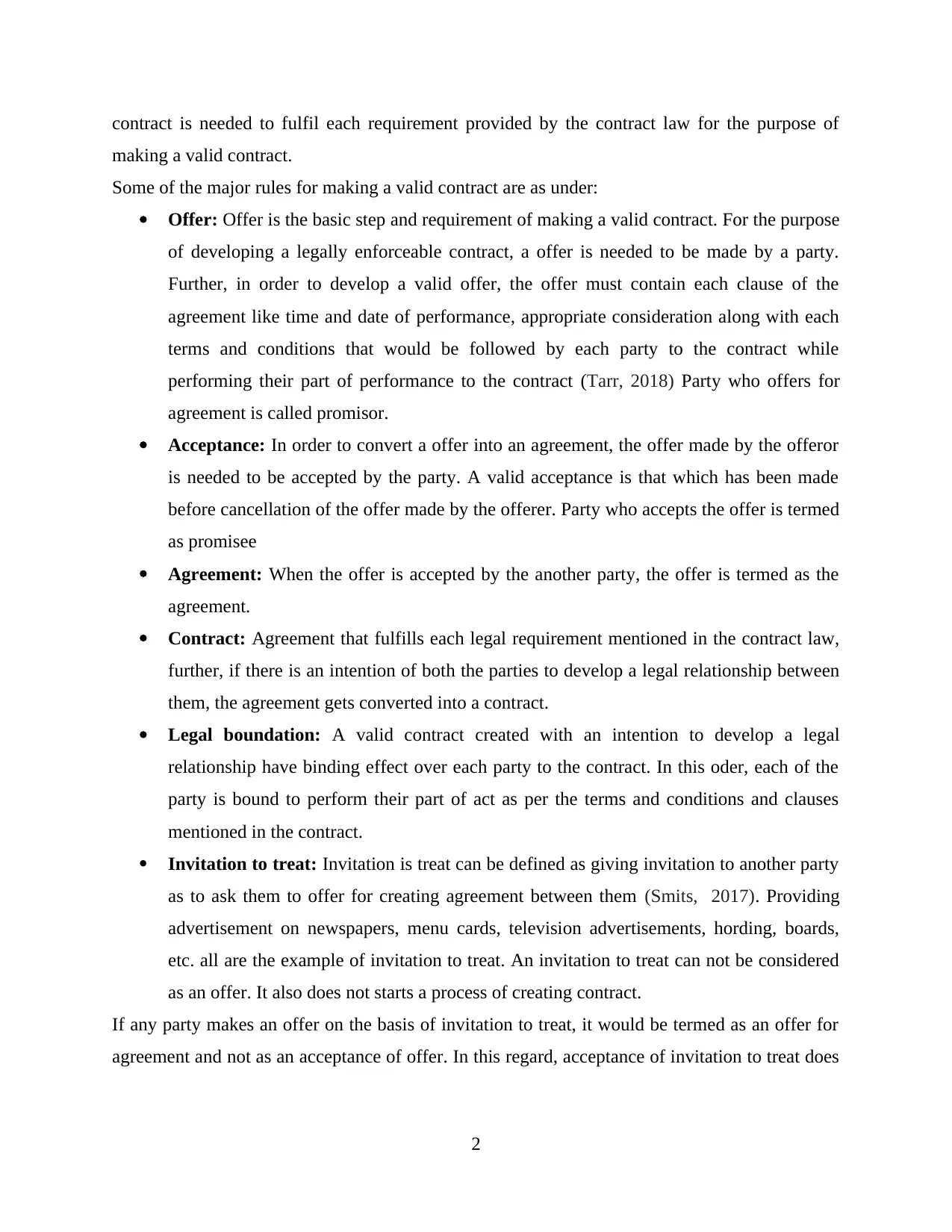
contract is needed to fulfil each requirement provided by the contract law for the purpose of
making a valid contract.
Some of the major rules for making a valid contract are as under:
Offer: Offer is the basic step and requirement of making a valid contract. For the purpose
of developing a legally enforceable contract, a offer is needed to be made by a party.
Further, in order to develop a valid offer, the offer must contain each clause of the
agreement like time and date of performance, appropriate consideration along with each
terms and conditions that would be followed by each party to the contract while
performing their part of performance to the contract (Tarr, 2018) Party who offers for
agreement is called promisor.
Acceptance: In order to convert a offer into an agreement, the offer made by the offeror
is needed to be accepted by the party. A valid acceptance is that which has been made
before cancellation of the offer made by the offerer. Party who accepts the offer is termed
as promisee
Agreement: When the offer is accepted by the another party, the offer is termed as the
agreement.
Contract: Agreement that fulfills each legal requirement mentioned in the contract law,
further, if there is an intention of both the parties to develop a legal relationship between
them, the agreement gets converted into a contract.
Legal boundation: A valid contract created with an intention to develop a legal
relationship have binding effect over each party to the contract. In this oder, each of the
party is bound to perform their part of act as per the terms and conditions and clauses
mentioned in the contract.
Invitation to treat: Invitation is treat can be defined as giving invitation to another party
as to ask them to offer for creating agreement between them (Smits, 2017). Providing
advertisement on newspapers, menu cards, television advertisements, hording, boards,
etc. all are the example of invitation to treat. An invitation to treat can not be considered
as an offer. It also does not starts a process of creating contract.
If any party makes an offer on the basis of invitation to treat, it would be termed as an offer for
agreement and not as an acceptance of offer. In this regard, acceptance of invitation to treat does
2
making a valid contract.
Some of the major rules for making a valid contract are as under:
Offer: Offer is the basic step and requirement of making a valid contract. For the purpose
of developing a legally enforceable contract, a offer is needed to be made by a party.
Further, in order to develop a valid offer, the offer must contain each clause of the
agreement like time and date of performance, appropriate consideration along with each
terms and conditions that would be followed by each party to the contract while
performing their part of performance to the contract (Tarr, 2018) Party who offers for
agreement is called promisor.
Acceptance: In order to convert a offer into an agreement, the offer made by the offeror
is needed to be accepted by the party. A valid acceptance is that which has been made
before cancellation of the offer made by the offerer. Party who accepts the offer is termed
as promisee
Agreement: When the offer is accepted by the another party, the offer is termed as the
agreement.
Contract: Agreement that fulfills each legal requirement mentioned in the contract law,
further, if there is an intention of both the parties to develop a legal relationship between
them, the agreement gets converted into a contract.
Legal boundation: A valid contract created with an intention to develop a legal
relationship have binding effect over each party to the contract. In this oder, each of the
party is bound to perform their part of act as per the terms and conditions and clauses
mentioned in the contract.
Invitation to treat: Invitation is treat can be defined as giving invitation to another party
as to ask them to offer for creating agreement between them (Smits, 2017). Providing
advertisement on newspapers, menu cards, television advertisements, hording, boards,
etc. all are the example of invitation to treat. An invitation to treat can not be considered
as an offer. It also does not starts a process of creating contract.
If any party makes an offer on the basis of invitation to treat, it would be termed as an offer for
agreement and not as an acceptance of offer. In this regard, acceptance of invitation to treat does
2
Paraphrase This Document
Need a fresh take? Get an instant paraphrase of this document with our AI Paraphraser
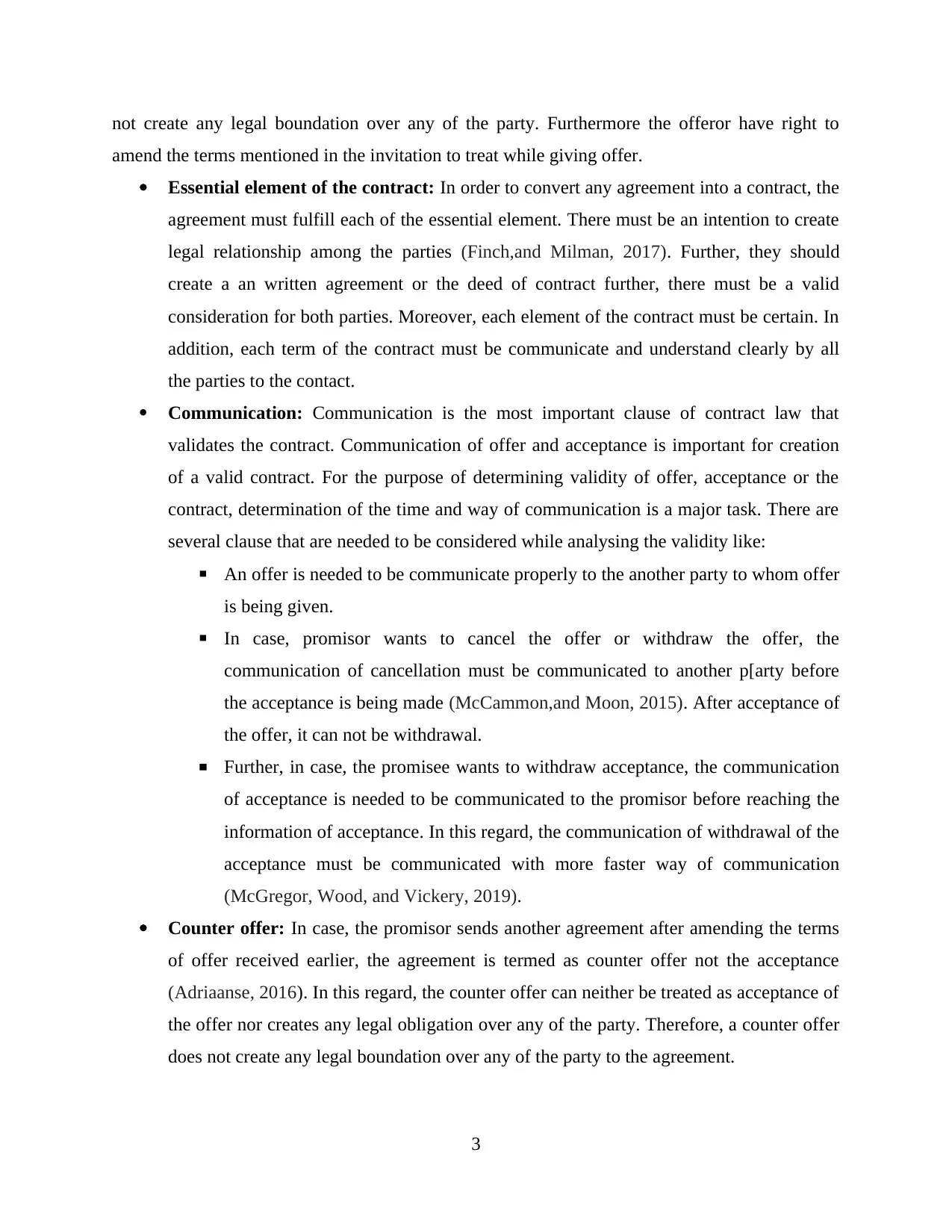
not create any legal boundation over any of the party. Furthermore the offeror have right to
amend the terms mentioned in the invitation to treat while giving offer.
Essential element of the contract: In order to convert any agreement into a contract, the
agreement must fulfill each of the essential element. There must be an intention to create
legal relationship among the parties (Finch,and Milman, 2017). Further, they should
create a an written agreement or the deed of contract further, there must be a valid
consideration for both parties. Moreover, each element of the contract must be certain. In
addition, each term of the contract must be communicate and understand clearly by all
the parties to the contact.
Communication: Communication is the most important clause of contract law that
validates the contract. Communication of offer and acceptance is important for creation
of a valid contract. For the purpose of determining validity of offer, acceptance or the
contract, determination of the time and way of communication is a major task. There are
several clause that are needed to be considered while analysing the validity like:
▪ An offer is needed to be communicate properly to the another party to whom offer
is being given.
▪ In case, promisor wants to cancel the offer or withdraw the offer, the
communication of cancellation must be communicated to another p[arty before
the acceptance is being made (McCammon,and Moon, 2015). After acceptance of
the offer, it can not be withdrawal.
▪ Further, in case, the promisee wants to withdraw acceptance, the communication
of acceptance is needed to be communicated to the promisor before reaching the
information of acceptance. In this regard, the communication of withdrawal of the
acceptance must be communicated with more faster way of communication
(McGregor, Wood, and Vickery, 2019).
Counter offer: In case, the promisor sends another agreement after amending the terms
of offer received earlier, the agreement is termed as counter offer not the acceptance
(Adriaanse, 2016). In this regard, the counter offer can neither be treated as acceptance of
the offer nor creates any legal obligation over any of the party. Therefore, a counter offer
does not create any legal boundation over any of the party to the agreement.
3
amend the terms mentioned in the invitation to treat while giving offer.
Essential element of the contract: In order to convert any agreement into a contract, the
agreement must fulfill each of the essential element. There must be an intention to create
legal relationship among the parties (Finch,and Milman, 2017). Further, they should
create a an written agreement or the deed of contract further, there must be a valid
consideration for both parties. Moreover, each element of the contract must be certain. In
addition, each term of the contract must be communicate and understand clearly by all
the parties to the contact.
Communication: Communication is the most important clause of contract law that
validates the contract. Communication of offer and acceptance is important for creation
of a valid contract. For the purpose of determining validity of offer, acceptance or the
contract, determination of the time and way of communication is a major task. There are
several clause that are needed to be considered while analysing the validity like:
▪ An offer is needed to be communicate properly to the another party to whom offer
is being given.
▪ In case, promisor wants to cancel the offer or withdraw the offer, the
communication of cancellation must be communicated to another p[arty before
the acceptance is being made (McCammon,and Moon, 2015). After acceptance of
the offer, it can not be withdrawal.
▪ Further, in case, the promisee wants to withdraw acceptance, the communication
of acceptance is needed to be communicated to the promisor before reaching the
information of acceptance. In this regard, the communication of withdrawal of the
acceptance must be communicated with more faster way of communication
(McGregor, Wood, and Vickery, 2019).
Counter offer: In case, the promisor sends another agreement after amending the terms
of offer received earlier, the agreement is termed as counter offer not the acceptance
(Adriaanse, 2016). In this regard, the counter offer can neither be treated as acceptance of
the offer nor creates any legal obligation over any of the party. Therefore, a counter offer
does not create any legal boundation over any of the party to the agreement.
3
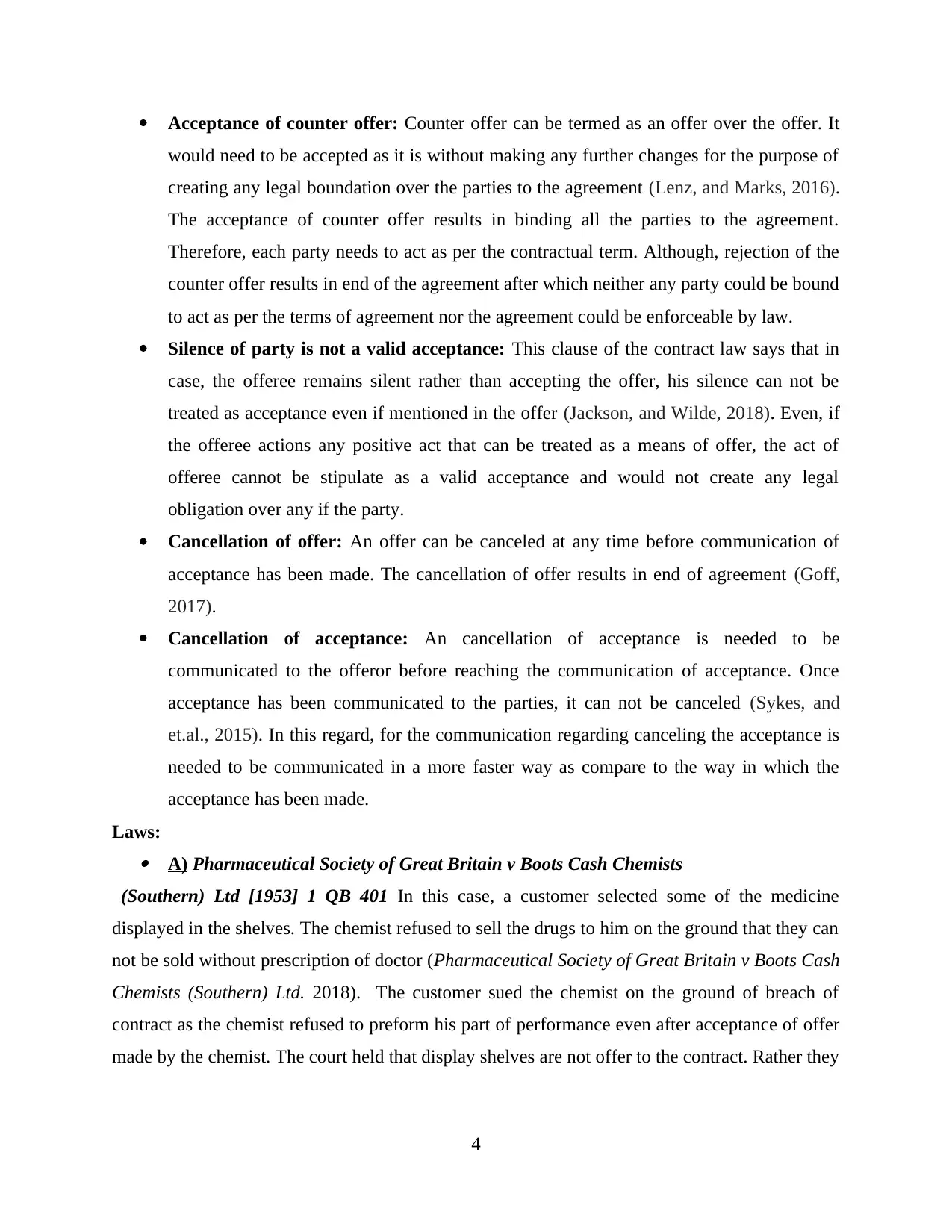
Acceptance of counter offer: Counter offer can be termed as an offer over the offer. It
would need to be accepted as it is without making any further changes for the purpose of
creating any legal boundation over the parties to the agreement (Lenz, and Marks, 2016).
The acceptance of counter offer results in binding all the parties to the agreement.
Therefore, each party needs to act as per the contractual term. Although, rejection of the
counter offer results in end of the agreement after which neither any party could be bound
to act as per the terms of agreement nor the agreement could be enforceable by law.
Silence of party is not a valid acceptance: This clause of the contract law says that in
case, the offeree remains silent rather than accepting the offer, his silence can not be
treated as acceptance even if mentioned in the offer (Jackson, and Wilde, 2018). Even, if
the offeree actions any positive act that can be treated as a means of offer, the act of
offeree cannot be stipulate as a valid acceptance and would not create any legal
obligation over any if the party.
Cancellation of offer: An offer can be canceled at any time before communication of
acceptance has been made. The cancellation of offer results in end of agreement (Goff,
2017).
Cancellation of acceptance: An cancellation of acceptance is needed to be
communicated to the offeror before reaching the communication of acceptance. Once
acceptance has been communicated to the parties, it can not be canceled (Sykes, and
et.al., 2015). In this regard, for the communication regarding canceling the acceptance is
needed to be communicated in a more faster way as compare to the way in which the
acceptance has been made.
Laws: A) Pharmaceutical Society of Great Britain v Boots Cash Chemists
(Southern) Ltd [1953] 1 QB 401 In this case, a customer selected some of the medicine
displayed in the shelves. The chemist refused to sell the drugs to him on the ground that they can
not be sold without prescription of doctor (Pharmaceutical Society of Great Britain v Boots Cash
Chemists (Southern) Ltd. 2018). The customer sued the chemist on the ground of breach of
contract as the chemist refused to preform his part of performance even after acceptance of offer
made by the chemist. The court held that display shelves are not offer to the contract. Rather they
4
would need to be accepted as it is without making any further changes for the purpose of
creating any legal boundation over the parties to the agreement (Lenz, and Marks, 2016).
The acceptance of counter offer results in binding all the parties to the agreement.
Therefore, each party needs to act as per the contractual term. Although, rejection of the
counter offer results in end of the agreement after which neither any party could be bound
to act as per the terms of agreement nor the agreement could be enforceable by law.
Silence of party is not a valid acceptance: This clause of the contract law says that in
case, the offeree remains silent rather than accepting the offer, his silence can not be
treated as acceptance even if mentioned in the offer (Jackson, and Wilde, 2018). Even, if
the offeree actions any positive act that can be treated as a means of offer, the act of
offeree cannot be stipulate as a valid acceptance and would not create any legal
obligation over any if the party.
Cancellation of offer: An offer can be canceled at any time before communication of
acceptance has been made. The cancellation of offer results in end of agreement (Goff,
2017).
Cancellation of acceptance: An cancellation of acceptance is needed to be
communicated to the offeror before reaching the communication of acceptance. Once
acceptance has been communicated to the parties, it can not be canceled (Sykes, and
et.al., 2015). In this regard, for the communication regarding canceling the acceptance is
needed to be communicated in a more faster way as compare to the way in which the
acceptance has been made.
Laws: A) Pharmaceutical Society of Great Britain v Boots Cash Chemists
(Southern) Ltd [1953] 1 QB 401 In this case, a customer selected some of the medicine
displayed in the shelves. The chemist refused to sell the drugs to him on the ground that they can
not be sold without prescription of doctor (Pharmaceutical Society of Great Britain v Boots Cash
Chemists (Southern) Ltd. 2018). The customer sued the chemist on the ground of breach of
contract as the chemist refused to preform his part of performance even after acceptance of offer
made by the chemist. The court held that display shelves are not offer to the contract. Rather they
4
⊘ This is a preview!⊘
Do you want full access?
Subscribe today to unlock all pages.

Trusted by 1+ million students worldwide
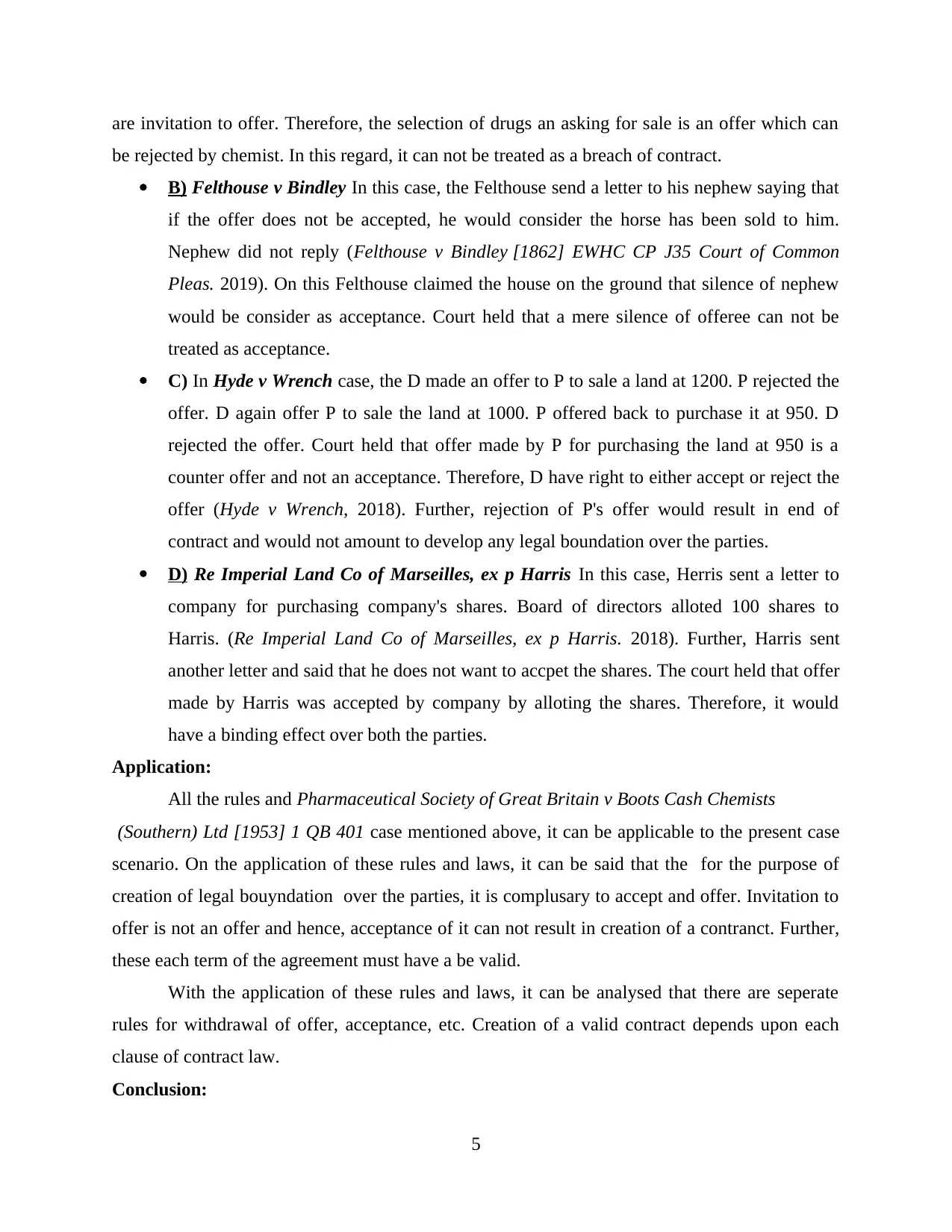
are invitation to offer. Therefore, the selection of drugs an asking for sale is an offer which can
be rejected by chemist. In this regard, it can not be treated as a breach of contract.
B) Felthouse v Bindley In this case, the Felthouse send a letter to his nephew saying that
if the offer does not be accepted, he would consider the horse has been sold to him.
Nephew did not reply (Felthouse v Bindley [1862] EWHC CP J35 Court of Common
Pleas. 2019). On this Felthouse claimed the house on the ground that silence of nephew
would be consider as acceptance. Court held that a mere silence of offeree can not be
treated as acceptance.
C) In Hyde v Wrench case, the D made an offer to P to sale a land at 1200. P rejected the
offer. D again offer P to sale the land at 1000. P offered back to purchase it at 950. D
rejected the offer. Court held that offer made by P for purchasing the land at 950 is a
counter offer and not an acceptance. Therefore, D have right to either accept or reject the
offer (Hyde v Wrench, 2018). Further, rejection of P's offer would result in end of
contract and would not amount to develop any legal boundation over the parties.
D) Re Imperial Land Co of Marseilles, ex p Harris In this case, Herris sent a letter to
company for purchasing company's shares. Board of directors alloted 100 shares to
Harris. (Re Imperial Land Co of Marseilles, ex p Harris. 2018). Further, Harris sent
another letter and said that he does not want to accpet the shares. The court held that offer
made by Harris was accepted by company by alloting the shares. Therefore, it would
have a binding effect over both the parties.
Application:
All the rules and Pharmaceutical Society of Great Britain v Boots Cash Chemists
(Southern) Ltd [1953] 1 QB 401 case mentioned above, it can be applicable to the present case
scenario. On the application of these rules and laws, it can be said that the for the purpose of
creation of legal bouyndation over the parties, it is complusary to accept and offer. Invitation to
offer is not an offer and hence, acceptance of it can not result in creation of a contranct. Further,
these each term of the agreement must have a be valid.
With the application of these rules and laws, it can be analysed that there are seperate
rules for withdrawal of offer, acceptance, etc. Creation of a valid contract depends upon each
clause of contract law.
Conclusion:
5
be rejected by chemist. In this regard, it can not be treated as a breach of contract.
B) Felthouse v Bindley In this case, the Felthouse send a letter to his nephew saying that
if the offer does not be accepted, he would consider the horse has been sold to him.
Nephew did not reply (Felthouse v Bindley [1862] EWHC CP J35 Court of Common
Pleas. 2019). On this Felthouse claimed the house on the ground that silence of nephew
would be consider as acceptance. Court held that a mere silence of offeree can not be
treated as acceptance.
C) In Hyde v Wrench case, the D made an offer to P to sale a land at 1200. P rejected the
offer. D again offer P to sale the land at 1000. P offered back to purchase it at 950. D
rejected the offer. Court held that offer made by P for purchasing the land at 950 is a
counter offer and not an acceptance. Therefore, D have right to either accept or reject the
offer (Hyde v Wrench, 2018). Further, rejection of P's offer would result in end of
contract and would not amount to develop any legal boundation over the parties.
D) Re Imperial Land Co of Marseilles, ex p Harris In this case, Herris sent a letter to
company for purchasing company's shares. Board of directors alloted 100 shares to
Harris. (Re Imperial Land Co of Marseilles, ex p Harris. 2018). Further, Harris sent
another letter and said that he does not want to accpet the shares. The court held that offer
made by Harris was accepted by company by alloting the shares. Therefore, it would
have a binding effect over both the parties.
Application:
All the rules and Pharmaceutical Society of Great Britain v Boots Cash Chemists
(Southern) Ltd [1953] 1 QB 401 case mentioned above, it can be applicable to the present case
scenario. On the application of these rules and laws, it can be said that the for the purpose of
creation of legal bouyndation over the parties, it is complusary to accept and offer. Invitation to
offer is not an offer and hence, acceptance of it can not result in creation of a contranct. Further,
these each term of the agreement must have a be valid.
With the application of these rules and laws, it can be analysed that there are seperate
rules for withdrawal of offer, acceptance, etc. Creation of a valid contract depends upon each
clause of contract law.
Conclusion:
5
Paraphrase This Document
Need a fresh take? Get an instant paraphrase of this document with our AI Paraphraser
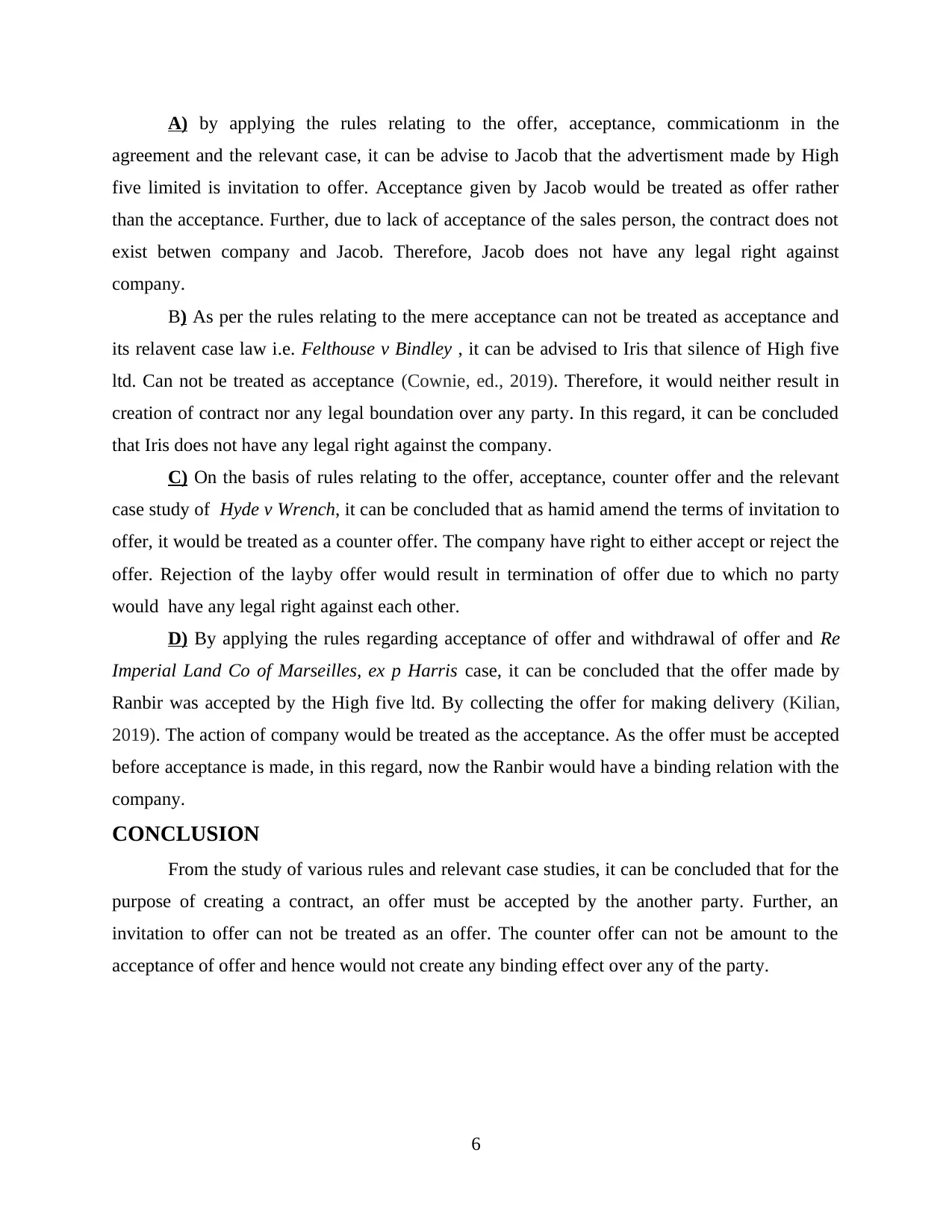
A) by applying the rules relating to the offer, acceptance, commicationm in the
agreement and the relevant case, it can be advise to Jacob that the advertisment made by High
five limited is invitation to offer. Acceptance given by Jacob would be treated as offer rather
than the acceptance. Further, due to lack of acceptance of the sales person, the contract does not
exist betwen company and Jacob. Therefore, Jacob does not have any legal right against
company.
B) As per the rules relating to the mere acceptance can not be treated as acceptance and
its relavent case law i.e. Felthouse v Bindley , it can be advised to Iris that silence of High five
ltd. Can not be treated as acceptance (Cownie, ed., 2019). Therefore, it would neither result in
creation of contract nor any legal boundation over any party. In this regard, it can be concluded
that Iris does not have any legal right against the company.
C) On the basis of rules relating to the offer, acceptance, counter offer and the relevant
case study of Hyde v Wrench, it can be concluded that as hamid amend the terms of invitation to
offer, it would be treated as a counter offer. The company have right to either accept or reject the
offer. Rejection of the layby offer would result in termination of offer due to which no party
would have any legal right against each other.
D) By applying the rules regarding acceptance of offer and withdrawal of offer and Re
Imperial Land Co of Marseilles, ex p Harris case, it can be concluded that the offer made by
Ranbir was accepted by the High five ltd. By collecting the offer for making delivery (Kilian,
2019). The action of company would be treated as the acceptance. As the offer must be accepted
before acceptance is made, in this regard, now the Ranbir would have a binding relation with the
company.
CONCLUSION
From the study of various rules and relevant case studies, it can be concluded that for the
purpose of creating a contract, an offer must be accepted by the another party. Further, an
invitation to offer can not be treated as an offer. The counter offer can not be amount to the
acceptance of offer and hence would not create any binding effect over any of the party.
6
agreement and the relevant case, it can be advise to Jacob that the advertisment made by High
five limited is invitation to offer. Acceptance given by Jacob would be treated as offer rather
than the acceptance. Further, due to lack of acceptance of the sales person, the contract does not
exist betwen company and Jacob. Therefore, Jacob does not have any legal right against
company.
B) As per the rules relating to the mere acceptance can not be treated as acceptance and
its relavent case law i.e. Felthouse v Bindley , it can be advised to Iris that silence of High five
ltd. Can not be treated as acceptance (Cownie, ed., 2019). Therefore, it would neither result in
creation of contract nor any legal boundation over any party. In this regard, it can be concluded
that Iris does not have any legal right against the company.
C) On the basis of rules relating to the offer, acceptance, counter offer and the relevant
case study of Hyde v Wrench, it can be concluded that as hamid amend the terms of invitation to
offer, it would be treated as a counter offer. The company have right to either accept or reject the
offer. Rejection of the layby offer would result in termination of offer due to which no party
would have any legal right against each other.
D) By applying the rules regarding acceptance of offer and withdrawal of offer and Re
Imperial Land Co of Marseilles, ex p Harris case, it can be concluded that the offer made by
Ranbir was accepted by the High five ltd. By collecting the offer for making delivery (Kilian,
2019). The action of company would be treated as the acceptance. As the offer must be accepted
before acceptance is made, in this regard, now the Ranbir would have a binding relation with the
company.
CONCLUSION
From the study of various rules and relevant case studies, it can be concluded that for the
purpose of creating a contract, an offer must be accepted by the another party. Further, an
invitation to offer can not be treated as an offer. The counter offer can not be amount to the
acceptance of offer and hence would not create any binding effect over any of the party.
6
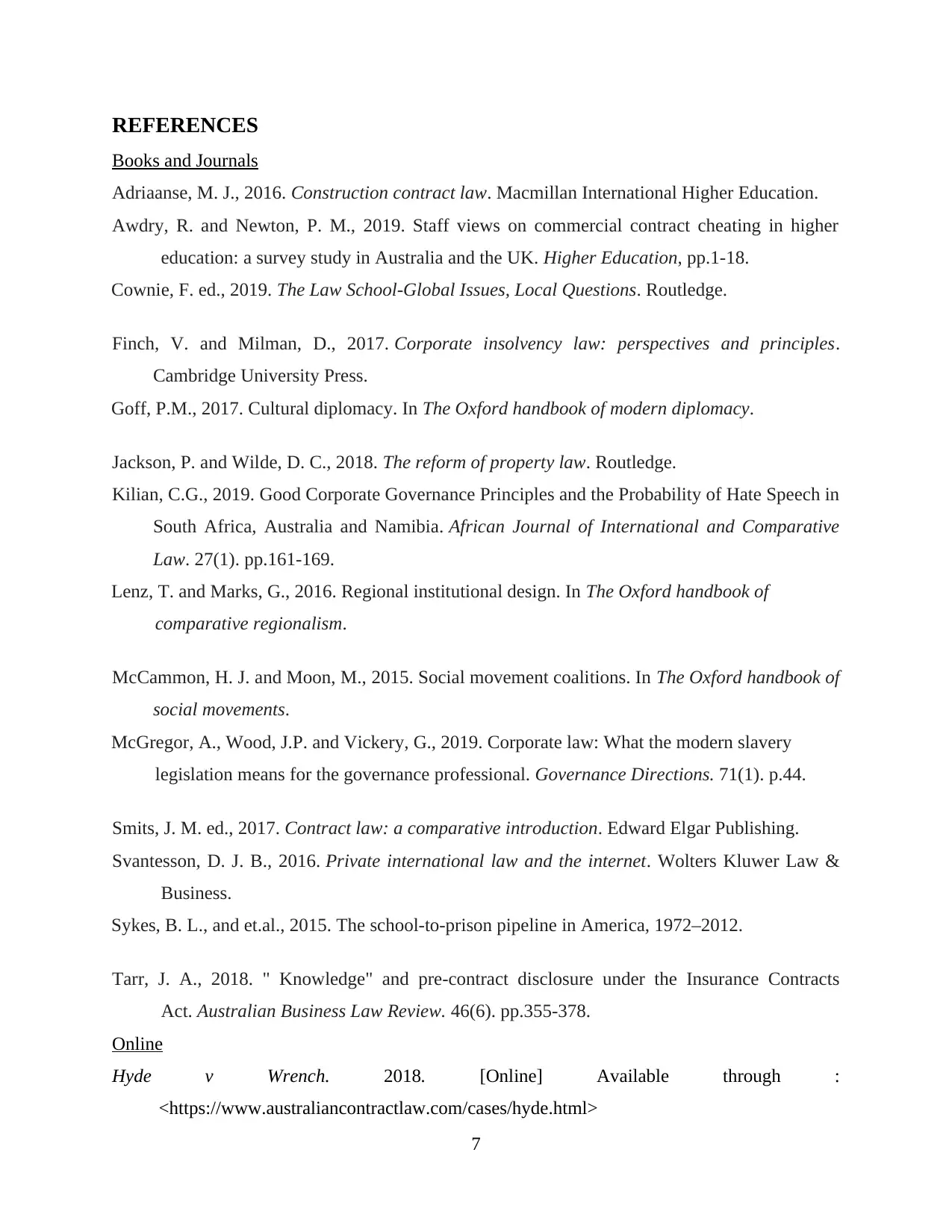
REFERENCES
Books and Journals
Adriaanse, M. J., 2016. Construction contract law. Macmillan International Higher Education.
Awdry, R. and Newton, P. M., 2019. Staff views on commercial contract cheating in higher
education: a survey study in Australia and the UK. Higher Education, pp.1-18.
Cownie, F. ed., 2019. The Law School-Global Issues, Local Questions. Routledge.
Finch, V. and Milman, D., 2017. Corporate insolvency law: perspectives and principles.
Cambridge University Press.
Goff, P.M., 2017. Cultural diplomacy. In The Oxford handbook of modern diplomacy.
Jackson, P. and Wilde, D. C., 2018. The reform of property law. Routledge.
Kilian, C.G., 2019. Good Corporate Governance Principles and the Probability of Hate Speech in
South Africa, Australia and Namibia. African Journal of International and Comparative
Law. 27(1). pp.161-169.
Lenz, T. and Marks, G., 2016. Regional institutional design. In The Oxford handbook of
comparative regionalism.
McCammon, H. J. and Moon, M., 2015. Social movement coalitions. In The Oxford handbook of
social movements.
McGregor, A., Wood, J.P. and Vickery, G., 2019. Corporate law: What the modern slavery
legislation means for the governance professional. Governance Directions. 71(1). p.44.
Smits, J. M. ed., 2017. Contract law: a comparative introduction. Edward Elgar Publishing.
Svantesson, D. J. B., 2016. Private international law and the internet. Wolters Kluwer Law &
Business.
Sykes, B. L., and et.al., 2015. The school-to-prison pipeline in America, 1972–2012.
Tarr, J. A., 2018. " Knowledge" and pre-contract disclosure under the Insurance Contracts
Act. Australian Business Law Review. 46(6). pp.355-378.
Online
Hyde v Wrench. 2018. [Online] Available through :
<https://www.australiancontractlaw.com/cases/hyde.html>
7
Books and Journals
Adriaanse, M. J., 2016. Construction contract law. Macmillan International Higher Education.
Awdry, R. and Newton, P. M., 2019. Staff views on commercial contract cheating in higher
education: a survey study in Australia and the UK. Higher Education, pp.1-18.
Cownie, F. ed., 2019. The Law School-Global Issues, Local Questions. Routledge.
Finch, V. and Milman, D., 2017. Corporate insolvency law: perspectives and principles.
Cambridge University Press.
Goff, P.M., 2017. Cultural diplomacy. In The Oxford handbook of modern diplomacy.
Jackson, P. and Wilde, D. C., 2018. The reform of property law. Routledge.
Kilian, C.G., 2019. Good Corporate Governance Principles and the Probability of Hate Speech in
South Africa, Australia and Namibia. African Journal of International and Comparative
Law. 27(1). pp.161-169.
Lenz, T. and Marks, G., 2016. Regional institutional design. In The Oxford handbook of
comparative regionalism.
McCammon, H. J. and Moon, M., 2015. Social movement coalitions. In The Oxford handbook of
social movements.
McGregor, A., Wood, J.P. and Vickery, G., 2019. Corporate law: What the modern slavery
legislation means for the governance professional. Governance Directions. 71(1). p.44.
Smits, J. M. ed., 2017. Contract law: a comparative introduction. Edward Elgar Publishing.
Svantesson, D. J. B., 2016. Private international law and the internet. Wolters Kluwer Law &
Business.
Sykes, B. L., and et.al., 2015. The school-to-prison pipeline in America, 1972–2012.
Tarr, J. A., 2018. " Knowledge" and pre-contract disclosure under the Insurance Contracts
Act. Australian Business Law Review. 46(6). pp.355-378.
Online
Hyde v Wrench. 2018. [Online] Available through :
<https://www.australiancontractlaw.com/cases/hyde.html>
7
⊘ This is a preview!⊘
Do you want full access?
Subscribe today to unlock all pages.

Trusted by 1+ million students worldwide
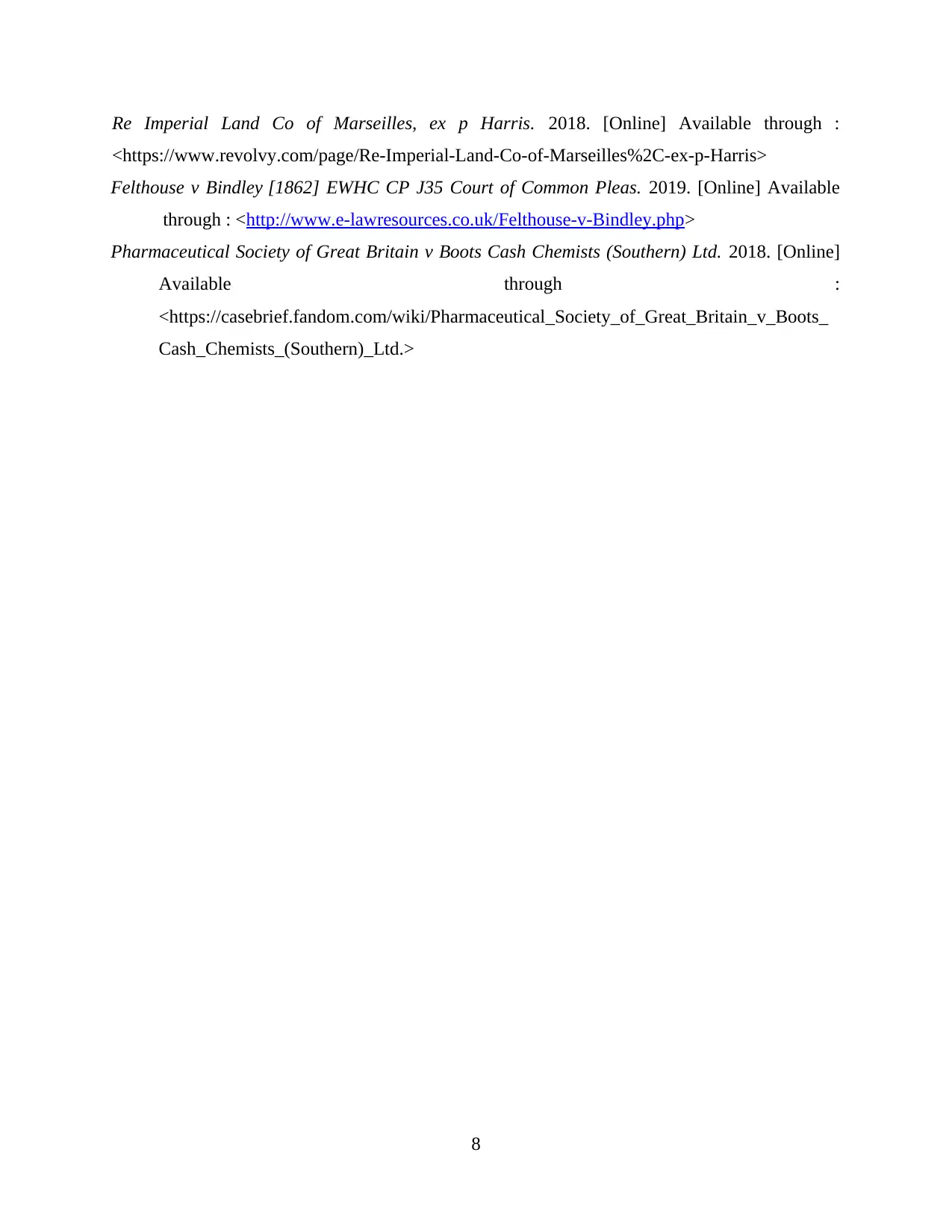
Re Imperial Land Co of Marseilles, ex p Harris. 2018. [Online] Available through :
<https://www.revolvy.com/page/Re-Imperial-Land-Co-of-Marseilles%2C-ex-p-Harris>
Felthouse v Bindley [1862] EWHC CP J35 Court of Common Pleas. 2019. [Online] Available
through : <http://www.e-lawresources.co.uk/Felthouse-v-Bindley.php>
Pharmaceutical Society of Great Britain v Boots Cash Chemists (Southern) Ltd. 2018. [Online]
Available through :
<https://casebrief.fandom.com/wiki/Pharmaceutical_Society_of_Great_Britain_v_Boots_
Cash_Chemists_(Southern)_Ltd.>
8
<https://www.revolvy.com/page/Re-Imperial-Land-Co-of-Marseilles%2C-ex-p-Harris>
Felthouse v Bindley [1862] EWHC CP J35 Court of Common Pleas. 2019. [Online] Available
through : <http://www.e-lawresources.co.uk/Felthouse-v-Bindley.php>
Pharmaceutical Society of Great Britain v Boots Cash Chemists (Southern) Ltd. 2018. [Online]
Available through :
<https://casebrief.fandom.com/wiki/Pharmaceutical_Society_of_Great_Britain_v_Boots_
Cash_Chemists_(Southern)_Ltd.>
8
1 out of 10
Related Documents
Your All-in-One AI-Powered Toolkit for Academic Success.
+13062052269
info@desklib.com
Available 24*7 on WhatsApp / Email
![[object Object]](/_next/static/media/star-bottom.7253800d.svg)
Unlock your academic potential
Copyright © 2020–2026 A2Z Services. All Rights Reserved. Developed and managed by ZUCOL.




